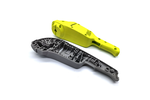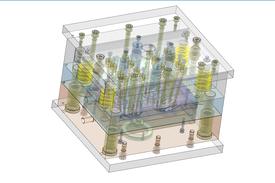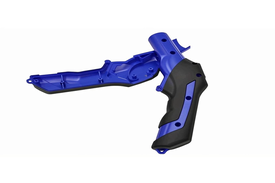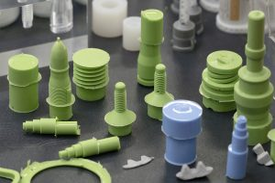Molding Injection
Home > Molding Injection
Elevate your product’s potential with precision-engineered custom injection moulded parts that refuse to compromise. You demand components that meet exact specifications, ensure supply chain reliability, and protect your margins—Jiaen MFG delivers exactly that. Experience stringent quality control, uncompromising on-time performance, and fiercely competitive pricing from your strategic manufacturing partner in China. This is how you build a tangible advantage.
Your Trusted Source for Injection Moulded Parts Supplier
Jiaen MFG delivers precision-engineered injection moulded parts built to perform in your most critical applications. Our components are engineered to balance material strength and structural integrity, ensuring consistent performance even in high-stress environments—so your end products maintain reliability under pressure. With our parts, you gain more than just superior quality; you get drop-in compatibility that simplifies assembly workflows and long-term durability that reduces replacement costs. Choose components that strengthen your supply chain. Choose Jiaen MFG
Some Products
OEM Molding Injection for Every Venture

OEM Plastic parts

OEM Plastic box

OEM Plastic parts

OEM Plastic parts

OEM Plastic box

OEM Plastic parts

Custom Molding Injection Needs
Table Of Contents For This Page
Covering every detail of custom plastic parts takes depth, which is why we’ve packed this page with the insights you need to make informed decisions—from material specs to manufacturing processes. To save you time sifting through the details, we’ve built a content directory that lets you jump directly to the information you’re after with a single click, ensuring you get the answers you need without delay.
General Applications For Molding Injection
- Automotive industry: Produce critical interior and exterior components, including instrument panels, door trims, seat frames, and under-hood plastic parts that meet strict durability standards.
- Electronic and electrical industry: Manufacture precision plastic enclosures, connectors, terminal blocks, and housing components that ensure electrical safety and performance.
- Household goods sector: Create durable plastic parts for furniture fittings, appliance components, kitchen utensils, and storage solutions tailored to daily use demands.
- Medical equipment field: Craft sterile, biocompatible plastic housings, handles, and fittings for diagnostic tools, surgical equipment, and patient care devices.
- Toy manufacturing: Produce safe, detailed plastic toys, figurines, building blocks, and interactive game components that meet global safety regulations.
- Packaging industry: Develop custom plastic containers, bottles, trays, and lids designed for product protection, shelf appeal, and user convenience.
- Construction sector: Fabricate high-performance plastic pipes, fittings, wall panels, and structural components resistant to corrosion and environmental stress.
- Industrial machinery: Manufacture robust plastic guards, control panel housings, handles, and wear-resistant components for heavy-duty equipment.
- Daily necessities: Produce everyday plastic items such as combs, toothbrushes, waste bins, and storage organizers optimized for functionality.
- Aerospace industry: Create lightweight, high-strength plastic interior components, cable management parts, and cabin fittings for aircraft.
Main Process for Molding Injection
Injection moulding stands as a cornerstone of modern plastics processing, a technology that powers critical manufacturing workflows across industries. At its core, it delivers results by injecting molten plastic into precision – crafted moulds, transforming raw materials into finished components with remarkable efficiency. For your production needs, this process doesn’t just meet standards—it excels, producing plastic parts with complex geometries, tight dimensional accuracy, and consistent quality, all while maintaining high throughput and cost – effective scaling that protects your bottom line.

Melting
- Raw material preparation: Choose high - quality plastic pellets tailored to your part’s requirements, then dry them thoroughly to eliminate moisture—critical for avoiding defects in the final product.
- Preheating the injection moulding machine: Power up the injection moulding system and preheat the barrel and mould to precise temperatures, ensuring the plastic melts uniformly and flows smoothly during production.
- Charging: Load the dried plastic granules into the machine’s barrel, where controlled heating begins the transformation from solid pellets to molten material ready for moulding.

Injection molding
- Melting: Plastic granules transform into a uniform molten state as the machine barrel maintains precise heating, ensuring optimal fluidity for your part’s design.
- Injection: Once molten plastic reaches target temperature and viscosity, the machine screw injects it into the mold cavity with controlled pressure—critical for capturing fine details in your components.
- Cooling: Molten plastic solidifies in the mold cavity, conforming to exact dimensions as cooling systems regulate temperature to prevent warping or defects in your final part.
- Mould opening: After full solidification, the mold opens to release your finished component, ready for post-processing or integration into your assembly line.

Pack & Shipping
- Post-processing: Finished parts undergo targeted refinements—such as deburring sharp edges or precision trimming—to ensure they meet your assembly-ready standards.
- Quality inspection: Rigorous checks verify every critical parameter, from surface finish and dimensional accuracy to structural strength, guaranteeing compliance with your specifications.
- Packing for shipment: Qualified parts are packed with industry-specific protection to prevent damage during transit, ensuring they arrive at your facility in pristine condition.
Estimated Cost Analysis For Molding Injection
Note that your final cost hinges on the customized services you need, the specifications of raw materials selected, applicable national regulations, and transportation distances. For reference, consider a scenario involving a full tall container shipment of your products.

The core costs behind your injection moulded parts include raw material expenses, mould fabrication costs, and skilled labor—all foundational to delivering quality. Beyond these, production efficiency metrics, rigorous quality control protocols, and other operational factors also influence your total investment, ensuring no hidden variables impact your budget.
$3,400
For shipments to the US, key cost drivers include transit distance, cargo weight, and volume—factors that directly shape freight calculations. Your choice of transport mode—sea, air, or road—further tailors costs to your timeline needs, while market rates, insurance coverage, and handling fees add critical layers to the logistics budget you can plan for.
$1,300
Based on our experience, estimated customs clearance and miscellaneous costs hinge on target country tariff policies and tax rates, ensuring compliance with local regulations. Additional considerations include customs brokerage fees, port charges, and warehousing expenses, while specialized packaging or protective measures for delicate parts will be factored in to preserve integrity during transit.
$800The Process Flow & Duration Estimation
Note that the total timeline for your injection moulding project hinges on mold complexity, production steps, specific requirements, order quantity, and shipping logistics—factors tailored to your unique needs.
Step 1: R&D Drawings (3-7 days)
This phase involves detailed design planning and drafting for your injection moulded parts. Timeline depends on drawing complexity and revision rounds, with designers refining specifications to ensure manufacturability and alignment with your requirements.

Step 2: Sampling (7-14 days)
Includes mould fabrication, injection moulding, and sample testing. Duration is shaped by mould production cycles, quality validation, and your feedback—with potential adjustments to ensure samples meet your exact standards before full production.

Step 3: Payment Processing (within 1 day)
Timelines vary based on your preferred payment method and internal financial workflows, keeping administrative delays minimal to keep your project on track.

Step 4: Bulk Manufacturing (30-45 days)
After sample approval and prep work completion, full-scale production begins. Timeline hinges on your order volume, production line efficiency, and any specialized processes required—this phase often takes the longest, particularly for large-volume orders, as we prioritize consistent quality across every unit to meet your specifications.

Step 5: Shipping (10-15 days)
Finally, the injection moulded parts will be transported to the designated location. The mode of transport, distance and logistical arrangements will have an impact on the duration of the transport phase.

Want to know how to slash production lead times?
The step-by-step framework for designing and manufacturing custom injection molded parts efficiently.
Our specialized rapid-response solutions tailored to meet your tight deadlines.
The Basic Knowledge About Molding Injection
Injection molding stands as a versatile, high-efficiency process ideal for producing high-volume plastic components—critical for scaling your production needs.
For large production runs, injection molding shines: it drives cost efficiency, generates minimal waste (with excess material often recyclable), and supports multi-material or multi-color production in a single cycle. The tradeoff? Initial mold design and fabrication costs can be significant, making it less cost-effective for small-volume projects. But if your operations—like those in automotive, consumer electronics, or medical devices—demand high-volume, precision parts, injection molding becomes essential to meeting your scalability and quality requirements.
The Common Pitfalls When Purchasing
In today’s global marketplace, international buyers of injection moulded parts often face avoidable pitfalls that can derail efficiency, compromise quality, or inflate costs. Recognizing these challenges and proactive solutions is key to securing successful, reliable sourcing.
- Quality Shortfalls
- Pricing Deception
- Mismatched Technical Requirements
- IP Violations
- Timeline Breaches
- Subpar Post-Sale Support
Injection moulded parts may arrive with defects, fail to meet specifications, or lack consistent quality—threatening your production integrity.
Solution: Partner with vetted suppliers, demand valid quality certifications and test reports, and validate samples or conduct on-site audits before full orders.
Suppliers may quote misleading base prices while hiding hidden fees, eroding your budget control.
Solution: Conduct thorough market research, compare detailed quotes from multiple sources, and lock in clear pricing terms in contracts to eliminate unexpected costs.
Parts delivered may not align with your required technical parameters, causing fit or performance issues.
Solution: Document detailed technical requirements, align on standards upfront, and confirm pre-production samples to ensure specs match your needs.
Unknowingly sourcing parts that violate IP rights can lead to legal and operational risks.
Solution: Require suppliers to provide IP ownership proof, conduct infringement checks, and verify compliance with global intellectual property regulations.
Late shipments disrupt your production timelines, creating costly bottlenecks.
Solution: Set strict delivery deadlines in contracts with penalty clauses, maintain regular communication, and track production and logistics progress proactively.
Lack of support post-purchase can leave you stranded with defective parts or unresolved issues.
Solution: Vet suppliers for strong after-sales reputations, clarify service commitments in agreements, and ensure clear channels for issue resolution.
Why PartnerWith Jiaen MFG For Your Injection Moulding Needs?
At Jiaen MFG, your injection moulding challenges become our engineering priorities. We specialize in translating your product requirements into precision-designed, custom-manufactured injection moulded components that drive your production success. With decades of industry immersion, we deliver mission-critical parts that balance uncompromising quality with cost efficiency—because your bottom line matters as much as your product performance. From initial design consultation to on-time delivery, we’re committed to making your supply chain run smoother. Partner with us to get injection moulded parts that meet your exact specifications—and add real value to your operations.

Injection moulded components are the backbone of your products—so choosing the right manufacturing partner directly impacts your success. Here’s why Jiaen MFG stands out as the partner you can rely on:Cutting-Edge Production Technology – We invest in advanced machinery and processes to ensure tighter tolerances, consistent quality, and complex geometries that match your most demanding designs.
Cutting-Edge Production Technology
Rigorous Quality Control
Tailored Customization
Proven Industry Expertise
Innovative R&D Capabilities.
Strategic Material Optimization
Efficient Production & Cost Control
Sustainable Manufacturing Practices.
Robust Supply Chain Management
Dedicated Technical Support
Selecting a supplier is about more than just price—it’s about finding a partner who understands your goals. With Jiaen MFG, you get the technical expertise, reliability, and collaboration needed to take your products to the next level.
The FAQs About Molding Injection
When sourcing injection moulding parts for your production line, you likely have critical questions that impact your supplier choice and final product quality. We’ve addressed the most common concerns below to help you make informed decisions that align with your manufacturing goals.
What materials are best suited for high-temperature injection moulded parts?
For applications requiring heat resistance (up to 260°C), engineering-grade plastics like PEEK, PPS, and glass-filled nylon are ideal. These materials maintain structural integrity under thermal stress, making them suitable for automotive, industrial, and electronics components. We’ll recommend the optimal material based on your specific temperature range and performance needs.
How tight of tolerances can you achieve for custom injection moulded parts?
Our precision moulding processes consistently deliver tolerances of ±0.02mm for most engineering plastics on critical dimensions. For highly specialized applications (such as aerospace or medical), we can achieve even tighter tolerances down to ±0.01mm using advanced CNC-controlled machines and in-process inspection systems.
What is your minimum order quantity (MOQ) for custom injection moulded parts?
Our standard MOQ for production runs is 5,000 units, which balances cost efficiency with production feasibility. For prototyping or low-volume needs, we offer flexible options starting at 50 units. Larger orders (50,000+ units) often qualify for volume-based pricing discounts.
Can you help optimize my part design to reduce manufacturing costs?
Yes. Our engineering team provides complimentary Design for Manufacturability (DFM) reviews. We identify opportunities like simplifying complex geometries, standardizing wall thicknesses, or suggesting cost-effective material alternatives—often reducing tooling and production costs by 10-20% without compromising quality.
What quality certifications do you hold, and how do you ensure compliance?
We’re ISO 9001:2015 and IATF 16949 certified for automotive components, with ISO 13485 compliance for medical-grade parts. Compliance is ensured through rigorous testing, including material traceability, in-process inspections, and final dimensional checks. We provide detailed quality reports tailored to your industry’s regulatory requirements.
Can I specify my own raw materials for production?
Absolutely. We welcome customer-specified materials. Simply share your approved vendor list or material specifications, and we’ll source, test, and process them according to your requirements. We also offer material recommendations if you’re looking to balance performance, cost, and availability.
How long does it take to develop a new mould and start production?
Mould development for simple to medium-complexity parts typically takes 4-6 weeks. Once the mould is approved, production samples are available within 1 week. Initial production runs of up to 10,000 units are completed within 2 weeks of sample approval. We provide a detailed timeline upfront to align with your project milestones.
What happens if there are supply chain disruptions or production delays?
We proactively manage risks with dual-sourcing for critical materials and maintaining safety stock for key resins. Our backup production facilities and flexible scheduling allow us to minimize delays—most disruptions result in lead time extensions of less than 3 business days. We keep you informed throughout the process to adjust plans if needed.














